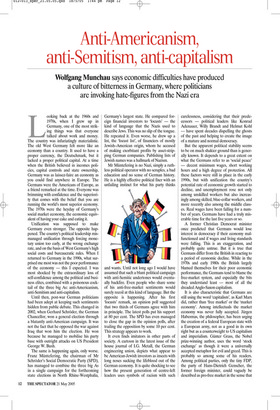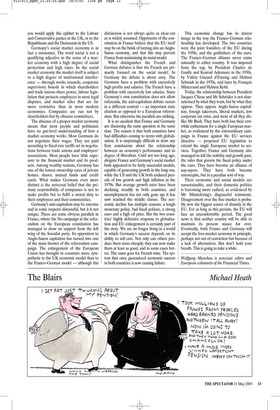Anti-Americanism,
anti-Semitism, anti-capitalism Wolfgang Munchau says economic difficulties have produced a culture of bitterness in Germany, where politicians are invoking hate-figures from the Nazi era Looking back at the 1960s and 1970s, when I grew up in Germany, one of the most striking things was that everyone talked about work and money. The country was infuriatingly materialistic. The old West Germany felt more like an economy than a country. It used to have a proper currency, the Deutschmark, but it lacked a proper political capital. At a time when the British believed in incomes policies, capital controls and state ownership, Germany was as laissez-faire an economy as you could find anywhere in Europe. The Germans were the Americans of Europe, as a friend remarked at the time. Everyone was brimming with confidence and the superiority that comes with the belief that you are running the world’s most superior economy. The 1970s were the heyday of Germany’s social market economy, the economic equivalent of having your cake and eating it.
Unification was supposed to make Germany even stronger. The opposite happened. The country’s political leadership mismanaged unification through forcing monetary union too early, at the wrong exchange rate, and on the basis of West Germany’s high social costs and bureaucratic rules. When I returned to Germany in the 1990s, what surprised me most was not the poor performance of the economy — this I expected. I was most shocked by the extraordinary loss of self-confidence among the political and business elites, combined with a poisonous cocktail of the three big As: anti-Americanism, anti-Semitism and anti-capitalism.
Until then, post-war German politicians had been adept at keeping such sentiments hidden from public debate. This changed in 2002, when Gerhard Schröder, the German Chancellor, won a general election through a blatantly anti-American campaign. It was not the fact that he opposed the war against Iraq that won him the election. He won because he managed to mobilise his party base with outright attacks on US President George W. Bush.
The same is happening again, only worse. Franz Müntefering, the chairman of Mr Schröder’s Social Democratic Party (SPD), has managed to combine the three big As in a single campaign for the forthcoming state elections in North Rhine-Westphalia, Germany’s largest state. He compared foreign financial investors to ‘locusts’ — the kind of language that the Nazis used to describe Jews. This was no slip of the tongue. He repeated it. Even worse, he drew up a list, the ‘locust list’, of financiers of mostly Jewish–American origin, whom he accused of making exorbitant profits by asset-stripping German companies. Publishing lists of Jewish names was a hallmark of Nazism.
Mr Müntefering is no Nazi, simply a ruthless political operator with no scruples, a bad education and no sense of German history. He is a highly effective political fixer with an unfailing instinct for what his party thinks and wants. Until not long ago I would have assumed that such a blunt political campaign with anti-Semitic undertones would eventually backfire. Even people who share some of his anti-free-market sentiments would surely recoil at this kind of language. But the opposite is happening. After his first ‘locusts’ remark, an opinion poll suggested that two thirds of Germans agree with him in principle. The latest polls put his support at 80 per cent. The SPD has even managed to close the gap in the opinion polls, after trailing the opposition by some 10 per cent. This strategy appears to work.
It even finds imitators in other parts of society. A cartoon in the latest issue of the house journal of I.G. Metall, the German engineering union, depicts what appear to be American-Jewish investors as insects with long noses sucking the lifeblood out of the German economy. It is quite shocking to see how the present generation of centre-left leaders uses symbols of racism with such carelessness, considering that their predecessors — political leaders like Konrad Adenauer, Willy Brandt and Helmut Kohl — have spent decades dispelling the ghosts of the past and helping to create the image of a mature and normal democracy.
But the apparent political stability seems to be on much shakier ground than is generally known. It depends to a great extent on what the Germans refer to as ‘social peace’ — decent minimum wages, short working hours and a high degree of protection. All these factors were still in place in the early 1990s, but with unification the country’s potential rate of economic growth started to decline, and unemployment rose not only among unskilled workers but also increasingly among skilled, blue-collar workers, and more recently also among the middle classes. Real wages have been falling for a number of years. Germans have had a truly miserable time for the last five years or so.
A former Christian Democrat minister once predicted that Germans would lose interest in democracy if their economy malfunctioned and if wages and living standards were falling. This is an exaggeration, and probably quite untrue. But it is true that Germans differ from the British in reacting to a period of economic decline. While in the 1970s and early 1980s the British largely blamed themselves for their poor economic performance, the Germans tend to blame the free-market system, and especially the bits they understand least — most of all the dreaded Anglo-Saxon capitalism.
It is also characteristic that Germans are still using the word ‘capitalism’, as Karl Marx did, rather than ‘free market’ or the ‘market economy’. Among intellectuals the market economy was never fully accepted. Jürgen Habermas, the philosopher, has been urging the creation of a federal European state with a European army, not as a good in its own right but as a counterweight to US capitalism and imperialism. Günter Grass, the Nobel prize-winning author, uses the word ‘stock exchange’ as though it were a universally accepted metaphor for evil and greed. This is probably so among some of his readers. Among political parties, only the tiny FDP, the party of Hans-Dietrich Genscher, the former foreign minister, could vaguely be described as pro-free market in the sense that you would apply this epithet to the Labour and Conservative parties in the UK, or to the Republicans and the Democrats in the US.
Germany’s social market economy is in fact a misnomer. The word social is not a qualifying adjective in the sense of a market economy with a high degree of social protection and high taxes. In the social market economy the market itself is subject to a high degree of institutional interference — through works councils, corporate supervisory boards in which shareholders and trade unions share power, labour legislation that protects employees in most legal disputes, and market rules that are far more restrictive than in most modern economies. Companies are run not by shareholders but by obscure committees.
The absence of a proper market economy means that most people and politicians have no gut-level understanding of how a market economy works. Most Germans do not negotiate their wages. They are paid according to fixed-rate tariffs set in negotiations between trade unions and employers’ associations. Most people have little exposure to the financial market and its products. Among wealthy nations, Germany has one of the lowest ownership rates of private homes, shares, mutual funds and credit cards. What makes Germany even more distinct is the universal belief that the primary responsibility of companies is not to make profits but to fulfil a moral duty to their employees and their communities.
Germany’s anti-capitalism may be extreme and in some respects distasteful, but it is not unique. There are some obvious parallels in France, where the No campaign in the referendum on the European constitution has managed to draw on support from the left wing of the Socialist party. Its opposition to Anglo-Saxon capitalism has turned into one of the main themes of the referendum campaign. The enlargement of the European Union has brought in countries more sympathetic to the UK economic model than to the Franco–German model — although this distinction is not always quite as clear-cut as is widely assumed. Opponents of the constitution in France believe that the EU itself may be on the brink of turning into an AngloSaxon economy, and that this may prevent France from maintaining its social model.
What distinguishes the French and German debates is that the French are primarily focused on the social model. In Germany the debate is about envy. The Germans have a problem with excessively high profits and salaries. The French have a problem with excessively low salaries. Since Germany’s own constitution does not allow referenda, the anti-capitalism debate occurs in a different context — an important state election as opposed to a European referendum. But otherwise the parallels are striking.
It is no accident that France and Germany are discussing the same question at the same time. The reason is that both countries have had difficulties coming to terms with globalisation. It is surprisingly difficult to draw any firm conclusions about the relationship between an economy’s performance and its degree of liberalism. Until not too long ago, dirigiste France and Germany’s social market both appeared to be fairly successful models, capable of generating growth in the long run, while the US and the UK both endured periods of low growth and high inflation in the 1970s. But average growth rates have been declining steadily in both countries, and unemployment has not only gone up; it has now reached the middle classes. The economic decline has multiple reasons: a tough monetary policy, bad fiscal policies, a strong euro and a high oil price. But the two countries’ highly defensive response to globalisation and EU enlargement is certainly part of the story. We are no longer living in a world in which Germany’s success depends on its ability to sell cars. Not only can others produce them more cheaply; they can now make them at least as good, and in some cases better. The same goes for French wine. The system that once guaranteed economic success in both countries is now causing failure. This economic change has its mirror image in the way the Franco–German relationship has developed. The two countries were the joint founders of the EU during the 1950s, and the godfathers of the euro. The Franco–German alliance never came naturally to either country. It was imposed from the top, by President Charles de Gaulle and Konrad Adenauer in the 1950s, by Valéry Giscard d’Estaing and Helmut Schmidt in the 1970s, and later by François Mitterrand and Helmut Kohl.
Today, the relationship between President Jacques Chirac and Mr Schröder is not characterised by what they want, but by what they oppose. They oppose Anglo-Saxon capitalism, foreign takeovers, liberal markets, low corporate tax rates, and most of all they dislike Mr Bush. They have both lost their erstwhile enthusiasm for a single European market, as evidenced by the extraordinary campaign in France against the EU services directive — proposed EU legislation to extend the single European market to services. Together, France and Germany also managed to kill the stability and growth pact, the rules that govern the fiscal policy under the euro. They have become an alliance of nay-sayers. They have both become eurosceptic, but in a peculiar sort of way.
Their economic and social models are unsustainable, and their domestic politics is becoming more radical, as evidenced by Mr Müntefering’s disgraceful comments. Disagreement over the free market is probably now the biggest source of disunity in the EU. For as long as this persists, the EU will face an uncomfortable period. The good news is that neither country will be able to maintain its present stance for ever. Eventually, both France and Germany will accept the free-market economy in principle, perhaps not out of conviction but because of a lack of alternatives. But don’t hold your breath. This is going to take a while.


























































 Previous page
Previous page